INDUSTRIAL &
TERMINAL RAILROADS &
RAIL-MARINE OPERATIONS
OF BROOKLYN, QUEENS, STATEN
ISLAND, BRONX &
MANHATTAN:
DEGNON
CONTRACTING,
DEGNON REALTY & TERMINAL
IMPROVEMENT,
DEGNON TERMINAL & RAILROAD
Long Island City, Queens, NY
(contracting & construction throughout New York State)
.
.
|
updated: |
|
| Degnon Terminal Map revised | 05 November 2022 |
..
.

Degnon Contracting
Michael J. Degnon owned a contracting and construction firm dating from the turn of the century. This firm would be the successful bidders on the Steinway Street Subway Tunnel, among other subway construction contracts. Where the firm was located exactly has not yet been revealed.
In 1903, Colin McLean, merged with Degnon Contracting and the Degnon - McLean Construction Co. was formed. McLean was another significant builder and contractor with significant experience in railroad construction, including the Baltimore & Ohio Railroad Bridge, which was completed in 1889 and spanned the Arthur Kill and linked Staten Island with New Jersey. Perhaps Degnon - McLean's most notable contribution to the New York City infrastructure is the construction of the Brooklyn anchorage of the Williamsburg Bridge.
Of special note: in 1912, employees of Degnon Construction were excavating for the Broadway subway in downtown Manhattan, they unearthed an eight foot diameter brick lined tunnel with a pair of rusty rails inside... which of course was the Beach Pneumatic Tube!
Also in 1912, plans were announced for linking Flushing and Jamaica Bays with a canal. The Degnon Contracting Company, began dredging Dutch Kills as well as grading, building and paving streets in their one hundred and twenty-five acre site in preparation for factories and warehouses.
During this same time frame and under contract with the New York City, Degnon also began the filling in of marshes and wetlands between Corona and Flushing with ashes. This is similar to the Brooklyn Ash Removal's role in the area and Degnon could very possibly have worked in conjunction with them, however no supporting documentation supports this hypothesis.
According to builders records, Degnon
had many locomotives, in several locations. All are listed as narrow
gauge locomotives, and apparently were used in a small settings such as
construction material hauling. Complicating matters slightly, is that the
H. K. Porter builders records reflect entries for:
Dengan Construction,
Degnan - McLean Construction, and
Degnan Realty & Terminal Improvement.
But strangely, all names are listed for Long Island City. We do know that Degnon (which is the correct spelling) was indeed partners with McLean for several of the subway construction contracts, so it is without any further doubt that "Degnan - McLean" is a misspelling of Degnon - McLean.
However, exhaustive research by this author has failed to produce any reference or records to a "Dengan" Construction. Therefore I am very inclined to believe, based solely on the location listed for Dengan (that being Long Island City), that the locomotives listed under this name are indeed for Degnon.
In 2019, John LaBarre was gracious enough to forward the following image of Degnon Contracting #5. Upon examination of the image, it appears to be a Vulcan Iron Works locomotive; not an H. K. Porter product. (Porter had the unique trademark of casting their name in the steam cylinder block.) This locomotive does not have that and its had the Vulcan feature of an angled notch between the cylinder and the valve casing. So this locomotive could very well be c/n 1702.
While the image is not dated, it is known that Degnon Contracting was awarded one of several contracts for the construction of a portion of the Mohonk Tunnel (Contract 47) in 1909, specifically the Wallkill Siphon and half the construction of the Bontique Tunnel, to include 9 miles of aqueduct, 2323 feet of shaft to also include 4 miles of cut and cover and 560' Mohonk Tunnel.
Another interesting item about the image, is it appears the locomotive is derailed. Rear right driver is on the rail but has a big gap between tire and railhead, and the front right is off, high and to the outside. It appears her left side drivers came off the rail, hence that lean. The dump cars to the forward and rear of the locomotive are level. Being 36" gauge, that lean would be accentuated. And that engineer don't look none too happy!
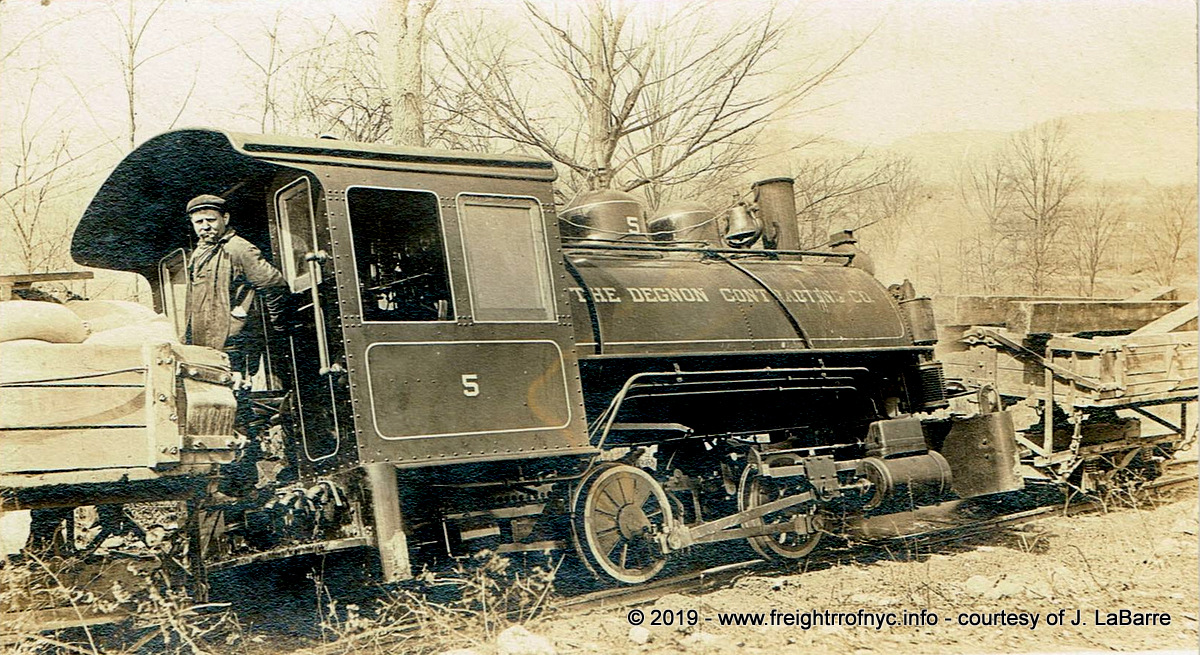
.
Degnon Realty & Terminal Improvement
There are several H. K. Porter narrow
gauge locomotives listed for Degnon Realty & Terminal Improvement but
judging from the size of the terminal however, it seems likely the Degnon
Realty & Terminal Improvement locomotives, as listed under this name,
were used solely at this location during the construction phase of the terminal
itself.
.
Degnon Terminal
Lapse forward a few years to 1913, and the Degnon Terminal was organized. This was a firm located on the south side of the PRR / LIRR Sunnyside Yards in Long Island City. It was also organized by Michael J. Degnon, who had already owned Degnon Contracting as mentioned above.
The Degnon Terminal was accessed by rail through the "Montauk Cut-Off" tracks of the LIRR. The following are clippings from New York Times advertisements / articles; that was located on the web. From this article we learn that Degnon intended to connect with the PRR and form it's own freight terminal.
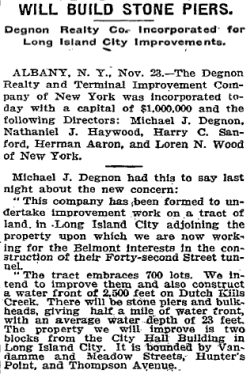 |
..... |
|
|
NY Times - November 24, 1905 |
NY Times - June 28, 1914 |
Next is an excerpt is from the "Abstracts of Annual Returns of Inchoate & Dormant Companies, Report of the Public Service Commission, First District, 1916":
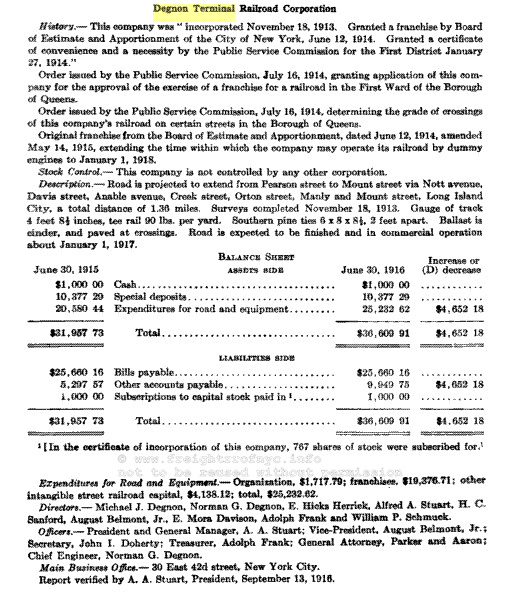
.
.
Apparently, two corporations had been organized, one for the construction phase of the property: "Degnon Realty & Terminal Improvement", and the "Degnon Terminal Railroad", once the terminal was completed. In the above document, we see that the Degnon Terminal was granted an extension in which the company may operate it's dummy engines to January 1, 1918, and that the gauge was standard (4' 8 ½").
None of the builders records I have access to and have searched, reflected any standard gauge locomotives listed for Degnon Terminal Railroad, yet upon finding that above report and knowing I had not previously come across any standard gauge Degnon locomotives in my research, caused me to go on a small crusade.
I eventually came across "Colin Churcher's Industrial Locomotives in Canada, Ontario page", and yes, it did reveal a standard gauge Degnon Terminal RR #2 0-6-0 built by Schenectady! (But my files did not show a second owner for this locomotive (that being Degnon). Also, Churcher's page states DTRR #2 was built in 1897, but Schenectady records reflect 7/1899 as a build date. Furthermore, according to the report above, the text states "locomotives" in the plural, so we can surmise that more may be located in the future. To date, all known photographs of switching movements in Degnon Terminal were of a LIRR locomotive.
Another notable fact is that one of the directors of the Degnon Terminal was August Belmont, Jr, who like his father, was involved in the construction and operation of the subways in New York.
Some of the businesses served by Degnon Terminal was Macy's & Gimbel's warehouses, American Chicle (Chiclets Gum) and the New York Metro area Studebaker automobile distribution point, and as previously mentioned Sunshine Biscuit.
Unfortunately, all of the maps seen to date of Degnon Terminal
occupants, as well as track layout are either hand drawn, have the
buildings skewed or the streets skewed; or in the case of the LIRR
issued map, a line schematic. Furthermore, each map (ca. 1930,
ca. 1948; September 1958, 1966 and 1978, vary in orientation. In short, it was
very confusing when comparing.
So, I took it upon
myself to compose a single map with all attributes. As you can imagine was no
easy task! Half way through, I asked myself, "Why am I doing this - as
the Long Island RR took over switching the terminal in 1928; and I have
refrained until now in covering Long Island Railroad operation?" In
short, Degnon was the equivalent of a sub-operation within the LIRR,
Not to mention my previous version of this map had a glaring error in
track placement and I made the mistake of saving the file as as .jpg,
which pixelated the original. Well, anything worth doing, is worth doing well.
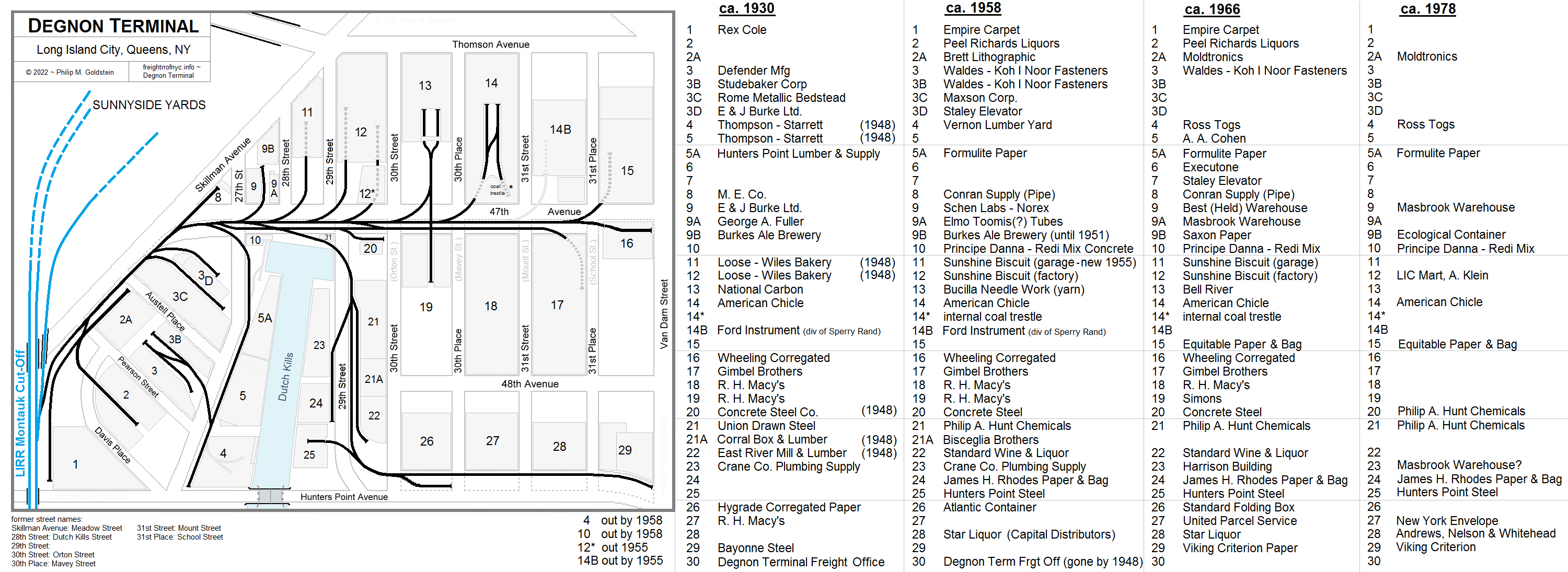 .
.
.
.
You can read the comprehensive history of all steam locomotive restrictions for the City of New York, beginning 1834 and ending with the Kaufman Act and its repeal on the main page of this website: Steam Locomotive Regulations within the City of New York. It is very much worth a read, because there are misconceptions about the Kaufman Act, i.e. such as it was repealed in 1930.
It appears the Degnon sold this terminal to Long Island Rail Road around this time, perhaps because it was not within Degnon's budget to convert the operation to electric locomotive or diesel, which was still a primitive type of power for locomotive use.
The Long Island Rail Road would absorb the Degnon Terminal properties in September 1928, and assumed freight operations and continued service for the occupants. Long Island Rail Road freight service for this area ceased around 1985 with LIRR removing the switch from the Montauk Cutoff in 1989.
For Long Island Rail Road era of operations, I recommend visiting the following page: Degnon Terminal (LIRR) - trainsarefun.com.
.
Degnon - McLean Construction Steam Locomotive Roster
| number / name |
builder |
c/n |
build date |
gauge | wheel arrangement |
wheel dia |
cylinders | acquired | disposition | notes | ref |
|
#1 "Josephine" |
H. K. Porter | 1927 | 1/1899 | 36" | 0-4-0T | 9 x 14 | new | unknown | Norfolk, VA | [3] | |
| H. K. Porter | 2510 | 4/1902 | 36" | 0-4-0T | 9 x 14 | new | unknown | Youngstown, OH | |||
| H. K. Porter | 2559 | 4/1902 | 36" | 0-4-0T | 9 x 14 | new | unknown | Youngstown, OH | [3] | ||
|
. |
|||||||||||
|
#3 |
H. K. Porter | 3667 | 9/1906 | 36" | 0-4-0T | 9 x 14 | new | unknown | [3] | ||
|
#4 |
H. K. Porter | 3673 | 9/1906 | 36" | 0-4-0T | 9 x 14 | new | unknown | [3] | ||
| H. K. Porter | 3806 | 1/1907 | 36" | 0-4-0T | 10 x 16 | new | unknown | [3] | |||
|
. |
|||||||||||
|
#11 |
H. K. Porter | 3896 | 8/1907 | 36" | 0-4-0T | 7 x 12 | new | unknown | [3] | ||
|
#12 |
H. K. Porter | 3897 | 8/1907 | 36" | 0-4-0T | 7 x 12 | new | unknown | [3] | ||
|
#7 |
H. K. Porter | 3912 | 5/1907 | 36" | 0-4-0T | 10 x 18 | new | unknown | [3] | ||
|
#8 |
H. K. Porter | 3915 | 5/1907 | 36" | 0-4-0T | 10 x 18 | new | unknown | [3] | ||
|
#9 |
H. K. Porter | 3920 | 7/1907 | 36" | 0-4-0T | 10 x 18 | new | unknown | [3] | ||
|
#10 |
H. K. Porter | 4009 | 7/1907 | 36" | 0-4-0T | 10 x 18 | new | unknown | [3] | ||
|
#1 |
Baldwin | 36248 | 3/1911 | 30" | Mule | new | unknown | 15 hp | [2] | ||
|
#2 |
Baldwin | 36249 | 3/1911 | 30" | Mule | new | unknown | 15 hp | [2] | ||
|
#5 |
VIW | 1702 | 2/1911 | 36" | 0-4-0T | new | unknown (to Degnon Contracting?) | [8] | |||
|
#6 |
VIW | 1703 | 2/1911 | 36" | 0-4-0T | new | unknown | [8] | |||
|
. |
|||||||||||
|
#2 |
Schenectady | 5220 | 7/1899 | std. | 0-6-0T (Dummy?) | used: Bellefonte Furnace on unknown date (but prior to 1915) |
sold 1924 to: Canadian Westinghouse renumbered 4; Hamilton By-Products Coke #4, 11/1942; |
[14] [32] |
|||
.
Memorabilia
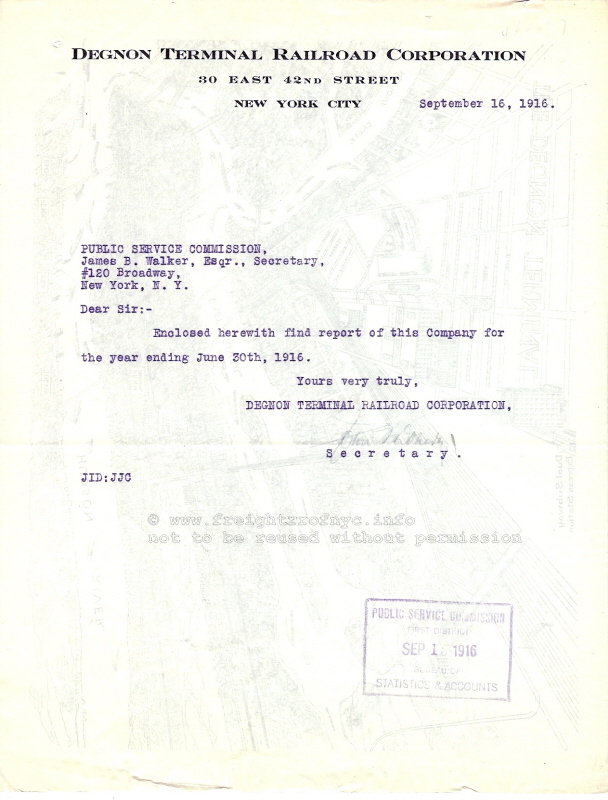
,.
.
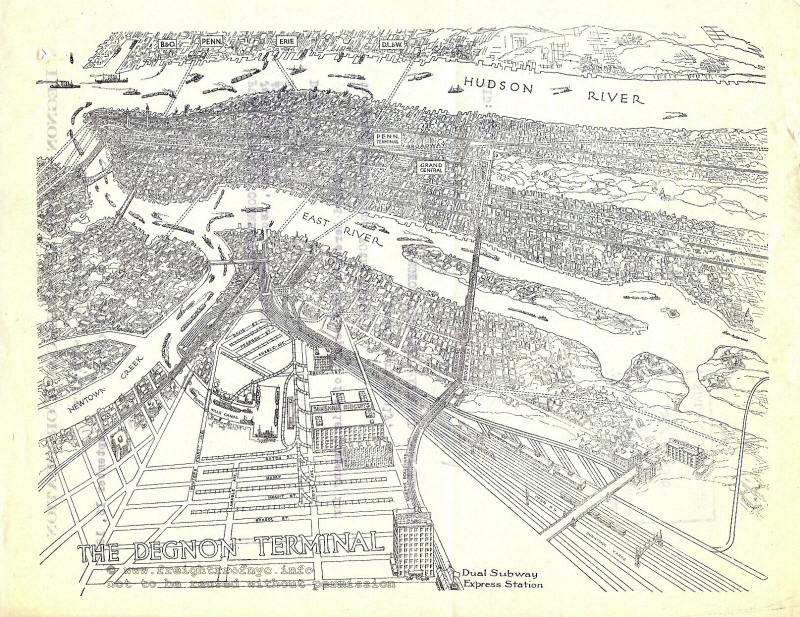
reverse of above letter
added 03 November 2010
.
.
.
Like what you see? Suggestions? Comments?